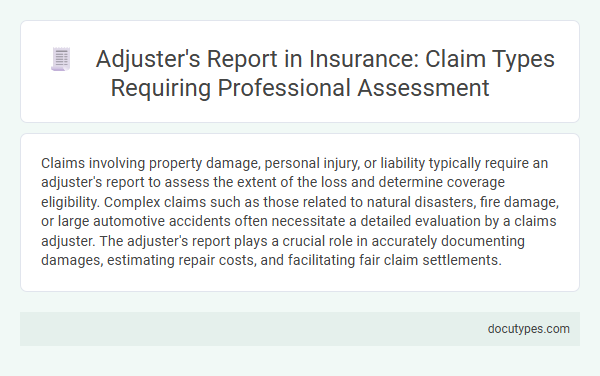Claims involving property damage, personal injury, or liability typically require an adjuster's report to assess the extent of the loss and determine coverage eligibility. Complex claims such as those related to natural disasters, fire damage, or large automotive accidents often necessitate a detailed evaluation by a claims adjuster. The adjuster's report plays a crucial role in accurately documenting damages, estimating repair costs, and facilitating fair claim settlements.
Understanding the Adjuster’s Report in Insurance Claims
Understanding the adjuster's report is essential for accurately processing insurance claims. This report provides a detailed evaluation of damages and helps determine claim validity and compensation amounts.
- Property Damage Claims - Adjusters assess the extent and cause of damage to residential or commercial properties to estimate repair or replacement costs.
- Automobile Accident Claims - The report includes damage assessment, fault determination, and evaluation of repair or total loss for vehicles involved in collisions.
- Liability Claims - Adjusters investigate circumstances and evidence to establish responsibility and potential payout in cases involving bodily injury or property damage to third parties.
Importance of Professional Assessment in Insurance Claims
What types of insurance claims require an adjuster's report? Complex claims involving property damage, liability, and significant financial loss often need a professional assessment to ensure accurate evaluation. An adjuster's report provides detailed documentation that supports fair settlement decisions in your insurance process.
Common Claim Types Requiring Adjuster Evaluation
Insurance claims involving property damage, such as those from fire, flood, or storms, typically require an adjuster's report to assess the extent of loss accurately. Auto accident claims often demand adjuster evaluation to determine liability and calculate repair costs. Personal injury and liability claims also benefit from a detailed adjuster's report to verify facts and support fair settlements.
Role of Adjusters in Property Damage Claims
Property damage claims often require an adjuster's report to accurately assess the extent of losses and determine appropriate compensation. These reports provide detailed evaluations of damaged structures, personal property, and related costs to ensure fair settlements.
Adjusters play a critical role in investigating claims by inspecting the property, documenting damages, and verifying policy coverage. Their expertise helps prevent fraudulent claims and supports both insurers and policyholders in the resolution process.
Handling Auto Insurance Claims: When Adjusters Are Needed
Auto insurance claims involving significant damage or injury require an adjuster's report to determine liability and estimate repair costs. This report ensures that claims are processed accurately and fairly.
Minor claims, such as small fender benders with no injuries, often do not need an adjuster's involvement. Complex claims involving multiple parties, injuries, or disputes typically require a detailed adjuster's assessment. Your insurance provider assigns an adjuster to handle these cases, ensuring proper evaluation and timely resolution.
Adjuster Assessment in Liability and Third-Party Claims
| Type of Claim | Role of Adjuster's Report | Key Elements in Adjuster Assessment |
|---|---|---|
| Liability Claims | Evaluates responsibility and extent of damages related to property damage or bodily injury caused by the insured |
|
| Third-Party Claims | Analyzes claims made by individuals or entities not directly insured under the policy, often involving liability issues |
|
Complex Claim Types: Fire, Flood, and Catastrophe Cases
Complex insurance claims such as fire, flood, and catastrophe cases require detailed evaluation by an adjuster to determine the extent of damage and coverage eligibility. These claims involve intricate assessments that go beyond simple property damage to include structural integrity, content loss, and environmental impact.
An adjuster's report in fire claims assesses smoke damage, cause of fire, and repair costs, providing a comprehensive basis for settlement. Flood claims require the adjuster to evaluate water intrusion levels, contamination risks, and mold potential, ensuring accurate compensation for restorations.
The Adjuster’s Involvement in Personal Injury Claims
Insurance claims involving personal injuries often require detailed evaluation to determine liability and compensation. An adjuster's report plays a critical role in this process by providing an objective assessment of the claim.
- Assessment of Injury Severity - The adjuster reviews medical reports and injury details to establish the extent of harm sustained.
- Liability Determination - The adjuster investigates the circumstances surrounding the incident to identify responsible parties.
- Compensation Evaluation - The report helps calculate appropriate settlement amounts based on injury impact and related expenses.
Fraud Investigation: Adjuster’s Role in Suspicious Claims
Insurance claims involving potential fraud require careful examination by an adjuster to ensure accuracy and legitimacy. Adjusters play a crucial role in investigating suspicious claims to protect your interests and prevent fraudulent payouts.
- Identification of Red Flags - Adjusters analyze inconsistencies and unusual patterns in claims to detect possible fraud.
- Verification of Claim Details - They thoroughly verify documentation, witness statements, and evidence to confirm the validity of a claim.
- Reporting Findings - Adjusters compile detailed reports that highlight suspicious activities and support further investigation or denial of claims.
The adjuster's report is essential in maintaining the integrity of the insurance process and safeguarding against fraudulent claims.
What Types of Claims Need an Adjuster’s Report? Infographic

